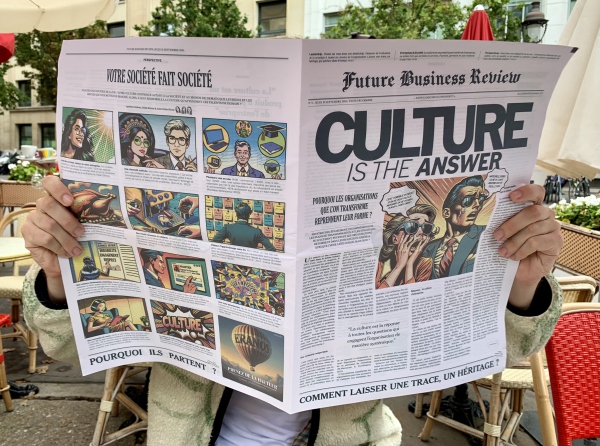What to Observe When Addressing Corporate Culture Issues
Addressing a corporate culture issue involves observing practices. In other words, if you want to understand the culture of a particular organization, you must start by examining its practices: governance, processes, operational modes, communication styles, methods of knowledge formalization, and so on. Along the way, you will identify key nodes and levers that have a greater impact during a transformation. That is our job!
How Sociology Informs My Consulting Practice
As a sociologist trained at EHESS, my approach to sociology in my daily consulting work can be summarized by a quote from philosopher John Dewey: “Philosophy reconnects with its vocation when it ceases to be a device of philosophers to address philosophers’ problems and becomes a method cultivated by philosophers to resolve human issues.”
The second lesson I have learned in my consulting career is this: when faced with numerous problems presented by clients that may seem unsolvable, it is always valuable to ask, "Is there a way of framing these problems that, precisely, prevents us from solving them?" This often leads to the realization that the client can be both "the problem" and "the solution." The strength of our work primarily rests on our ability to accurately define the problem.
Therefore, a pragmatic approach must be combined with a systemic one. You cannot claim to help an organization solve a problem without a systemic vision. Otherwise, you risk working on the wrong scale, misidentifying the object of concern, or overlooking crucial dimensions. This is our responsibility, not the client’s.
You learn all of this through practice, not just by reading books on change management (even if some of them are excellent!). Of course, you can make mistakes and face resistance to change, but regardless of the outcome, you must be driven by one requirement: success. So, it’s a balancing act!
❝I’ve never felt more like a sociologist for two reasons: nobody knows I'm a sociologist, and I don’t engage in theoretical sociology!❞
What Perspective Do You Have on How Companies Approach the Notion of Culture?
Paradoxically, I have never heard as much about the concept of "culture" as I have since I started working with organizations. This notion is at the heart of concerns and, in turn, raises questions of meaning and significance related to new ways of engaging in work.
However, there is a pitfall to avoid: "culture," like "strategy," is polysemous. While these terms may seem to resonate with everyone, it remains difficult to concretely describe what they encompass. This is why a systemic vision is absolutely crucial to establish links between these concepts, which, without careful examination, can become catch-all phrases or somewhat vague concepts that span from cognitive sciences to social sciences.
What Assessment Do You Have as a Sociologist After All These Years in Consulting? Would You Consider Yourself a Fulfilled Sociologist?
Yes, absolutely! I’ve never felt more like a sociologist for two reasons: nobody knows I’m a sociologist, and I don’t engage in theoretical sociology!
What Is the Challenge of Social Sciences in the Business World?
The challenge is paradoxical. On one hand, social sciences have never resonated as much as they have in the past fifteen years beyond the academic sphere, and it’s satisfying that a number of concepts have permeated society, especially in light of the human, technological, ecological, and environmental challenges we face. Social sciences serve as a reference for understanding and, above all, for taking action. However, there is a deeper issue regarding their usage—or more precisely, the correct usage of social sciences. For example, a sociological concept is not a trend. A concept is mobilized following a series of studies and is tested against real-world evidence. Therefore, it is essential to promote reasonable and informed usage; otherwise, the effects can be absolutely detrimental.
What Is the Issue Surrounding the Overuse of These Concepts? Why Is It Detrimental?
There are two ways to approach sociology: either as a purely theoretical discipline or as a resolutely empirical activity. I believe in the latter: describing a given situation is already a form of analysis. Good description enables knowledge sharing and helps identify solutions to the problems we face.




